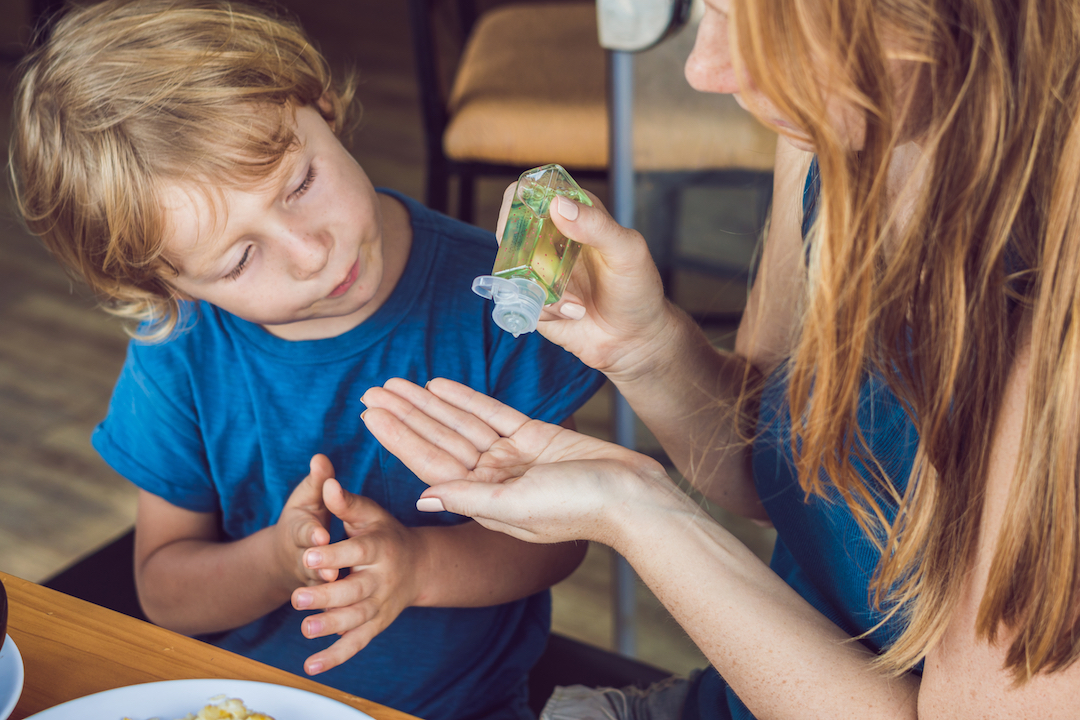How does hand sanitizer work?
Reference article: Facts about hand sanitizer.

Get the world’s most fascinating discoveries delivered straight to your inbox.
You are now subscribed
Your newsletter sign-up was successful
Want to add more newsletters?

Delivered Daily
Daily Newsletter
Sign up for the latest discoveries, groundbreaking research and fascinating breakthroughs that impact you and the wider world direct to your inbox.

Once a week
Life's Little Mysteries
Feed your curiosity with an exclusive mystery every week, solved with science and delivered direct to your inbox before it's seen anywhere else.

Once a week
How It Works
Sign up to our free science & technology newsletter for your weekly fix of fascinating articles, quick quizzes, amazing images, and more

Delivered daily
Space.com Newsletter
Breaking space news, the latest updates on rocket launches, skywatching events and more!

Once a month
Watch This Space
Sign up to our monthly entertainment newsletter to keep up with all our coverage of the latest sci-fi and space movies, tv shows, games and books.

Once a week
Night Sky This Week
Discover this week's must-see night sky events, moon phases, and stunning astrophotos. Sign up for our skywatching newsletter and explore the universe with us!
Join the club
Get full access to premium articles, exclusive features and a growing list of member rewards.
Hand sanitizers provide a convenient and effective way to clean your hands if soap and water aren't available and your hands aren't covered in visible dirt or grease. According to a 2019 ruling by the FDA, a product can be marketed as a hand sanitizer if it contains ethyl alcohol (also called ethanol), isopropyl alcohol (isopropanol) or benzalkonium chloride as the active ingredient.
The FDA hasn't made a decision on whether to categorize those three ingredients as "generally recognized as safe" because the agency doesn't think there is enough research to say. But they're also not pulling the products from shelves. Ingredients other than those three have shown little to no evidence of being effective at killing germs and have not won the FDA's approval.
How does hand sanitizer work?
The key ingredient in most hand sanitizers is alcohol. Chemically speaking, alcohols are organic molecules made of carbon, oxygen and hydrogen. Ethanol is the chemical in alcoholic drinks and is the chemical most people are thinking of when they say alcohol. Propanol and isopropanol (isopropyl alcohol) are two other alcohols that are common in disinfectants because they're highly soluble in water, just like ethanol.
Alcohols destroy disease-causing agents, or pathogens, by breaking apart proteins, splitting cells into pieces or messing with a cell's metabolism, according to a 2014 review published in the journal Clinical Microbiology Reviews. Solutions with as little as 30% alcohol have some pathogen-killing ability, and the effectiveness increases with increasing alcohol concentration. Studies have shown that alcohol kills a more broad variety of bacteria and viruses when the concentration exceeds 60%, and it works faster as the concentration increases. But the effectiveness of alcohol seems to top out at about a 90-95% concentration.
Another strength of alcohol is that the bacteria it kills don't develop a resistance to it, so alcohol doesn't lose effectiveness with continued use.
According to the 2014 review, ethanol is so powerful that a few studies have found that in high concentrations, it's better at getting rid of three species of disease-causing bacteria — Escherichia coli, Serratia marcescens and Staphylococcus saprophyticus — compared with washing hands with regular or antibacterial soap.
Related: Hand sanitizer sold out? Here's how to make your own.
Get the world’s most fascinating discoveries delivered straight to your inbox.
But alcohol doesn't work for all germs, such as norovirus; Clostridium difficile, which can cause life-threatening diarrhea; or Cryptosporidium, a parasite that causes a diarrheal disease called cryptosporidiosis, the Centers for Disease Control and Prevention says. Hand sanitizers also don't remove harmful chemicals like pesticides or heavy metals, nor does hand sanitizer work well on especially dirty or greasy hands. So, soap and water still win the contest overall.
There are a few small-scale studies demonstrating that an alcohol-free hand sanitizer containing benzalkonium chloride as the active ingredient, at a concentration of 0.13%, is just as effective and even more effective than alcohol at getting rid of bacteria. The alcohol-free hand sanitizer that was tested was called HandClens, and the scientists who conducted the research on it worked for the now-closed laboratory that developed the product. That doesn't mean benzalkonium chloride isn't effective, but there doesn't seem to be independent research to suggest that it's better than alcohol. Plus, benzalkonium chloride might be harmful for some individuals, especially at higher concentrations, according to the Hazardous Substances Database.
According to the CDC, hand sanitizer without alcohol may not kill as many germs and may only reduce the growth of germs rather than killing them outright. The CDC recommends hand sanitizers with at least 60% alcohol in them for maximum effectiveness.
Does hand sanitizer expire?
Hand sanitizer doesn't really expire. There will likely be an expiration date on the bottle because hand sanitizers are regulated by the FDA, which requires certain things to be on the packaging, including an expiration date. The expiration date is supposed to be the last date at which the product contains the ingredients in the amount specified on the label. Whether the manufacturer has tested how long the product meets the label claim or they just came up with an arbitrary date to determine the expiration date is mostly unknown to consumers. (Manufacturers are supposed to conduct testing, but not all do.)
Alcohol is a shelf-stable chemical according to its safety data sheet from chemical-supplier Sigma Aldrich. This means that if alcohol is kept in a sealed container at room temperature it will remain at the same concentration for a very, very long time.
However, alcohol evaporates easily because of its relatively low boiling point, and over time, as the bottle is opened and closed, some alcohol may escape and the concentration of alcohol in your hand sanitizer might start to decrease. Still, if you keep the bottle closed and at room temperature, you're likely to have an effective product for as long you need it.
Is hand sanitizer bad for you or toxic?
Alcohols are considered safe for use as an antiseptic and generally have no toxic effect on the skin, although repeated use may cause dryness or mild irritation, according to the Hazardous Substances Database. Several studies have shown that repeated use of hand sanitizer is less irritating than repeated hand washing with soap. But damaged skin is more susceptible to irritation from alcohol.
And let's be honest, would you rather have some mild skin irritation, or distribute and contract an illness?
Additional resources:

Kimberly has a bachelor's degree in marine biology from Texas A&M University, a master's degree in biology from Southeastern Louisiana University and a graduate certificate in science communication from the University of California, Santa Cruz. She is a former reference editor for Live Science and Space.com. Her work has appeared in Inside Science, News from Science, the San Jose Mercury and others. Her favorite stories include those about animals and obscurities. A Texas native, Kim now lives in a California redwood forest.
 Live Science Plus
Live Science Plus










